There have been 93 new cases of Covid-19 reported, the Department of Health has said.
The Department has reported no further coronavirus-related deaths.
It brings the total number of confirmed cases since the outbreak began to 28,453, while there have been 1,777 deaths associated with the virus.
Acting Chief Medical Officer Dr Ronan Glynn said the National Public Health Emergency Team considered the issue of pubs that do not serve food at its meeting today.
But he said given the current epidemiological situation it did not feel it would be appropriate for them to open next week and the situation is being kept under review.
"Given the current epidemiological situation" NPHET does not feel we are in a position to reopen pubs at this point, Acting Chief Medical Officer Dr @ronan_glynn says | https://t.co/Gekk9gtIB2 pic.twitter.com/AdN7sjbZoe
— RTÉ News (@rtenews) August 27, 2020
Dr Glynn also said that NPHET is not contemplating a national lockdown "as we stand" but it is monitoring the data.
He said while case numbers are not escalating rapidly they are escalating and if this continues we will see knock on effects in hospitals.
52 of the 93 Covid-19 cases reported today are among men and 41 among women. 70% involve people under the age of 45.
73 are associated with outbreaks or area close contacts of a confirmed case and 12 cases are reported as community transmission.
34 of the cases are in Dublin, with seven in Kildare, six each in counties Donegal and Laois and five each in Limerick and Wexford.
The remaining 30 cases are in Carlow, Cavan, Clare, Cork, Louth, Meath. Monaghan, Offaly, Tipperary, Westmeath and Wicklow.
Professor Philip Nolan, head of the National Public Health Emergency Team Epidemiological Modelling Group, said the reproduction number for the virus is between 1.0 and 1.2.
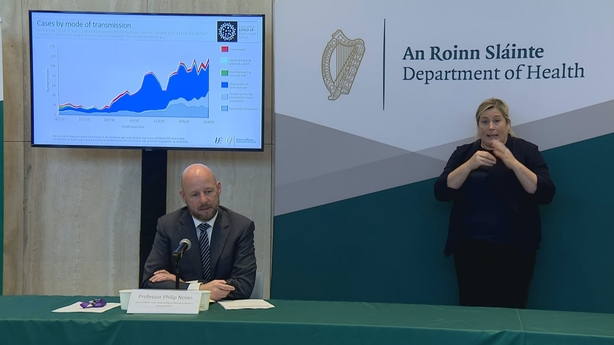
He said the "level of disease continues to grow" and that "outbreaks are coming under control but disease is spreading in these outbreaks".
Dr Glynn said: "We continue to see a slow growth of Covid-19 in Ireland.
"The most effective action we can take to reduce the transmission rate of this virus is to reduce our number of close contacts."
He said this needs to be a national focus over the next two weeks.
"We want as much of society as possible to open up" but people must work together to achieve this, he added.
Dr Glynn said that while the situation is improving in Kildare, the number of cases in the county has not stabilised to enable a lifting of restrictions at this point and the situation will continue to be closely monitored.
He said the positivity rate is 2% which means "the vast majority of people tested don't have Covid" but he urged those with symptoms to get a test.
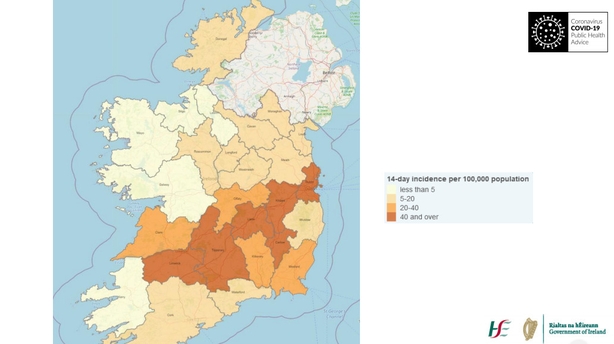
Prof Nolan said there are some worrying trends in relation to standard case numbers and severity. In June and July, the average number cases per day was between 10 and 20 but this has risen to a rate of over 100.
He said a number of weeks ago there were fewer than 100 cases per week but this has risen to more than 700 per week, with an average of 120 cases per day.
In June and July, the rate of 14 day cumulative incidents was at 3 per 100,000. This has risen to 33 per 100,000.
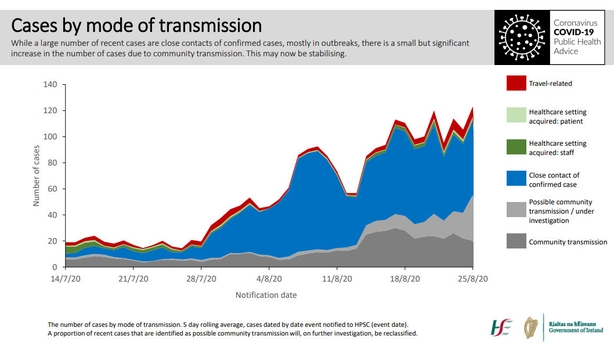
Prof Nolan said said there is also a significant increase in the numbers in hospital, with 29 patients in hospital today. The number of patients in intensive care remains low and there are very few deaths.
He said the key to suppressing the virus is to stick to the advice from health officials, particularly in relation to limiting social interactions.
"We're all going to have to ration the number of people we meet" and "we need to starve this virus of the opportunity to transmit," he added.
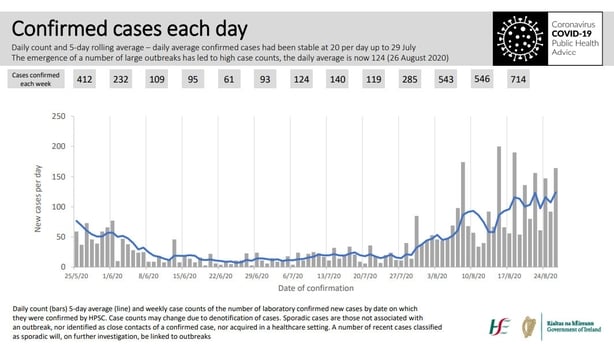
Latest coronavirus stories
View: Slides from Dept of Health briefing
We need your consent to load this rte-player contentWe use rte-player to manage extra content that can set cookies on your device and collect data about your activity. Please review their details and accept them to load the content.Manage Preferences
In Northern Ireland, 69 new cases were reported by the Department of Health today, bringing the total number of cases there to 6,964.
There has also been one more Covid-19 related death, bringing the total to 560.
Earlier, the department said that the coronavirus R number is between 1.0 and 1.6.
The 14-day incidence of Covid-19 in Northern Ireland is 36.9 per 100,000.
The latest figures from the European Centre for Disease Prevention and Control show that Ireland's 14-day incidence of cases per 100,000 people stands at 31.1.
This day last week. 20 August, the 14-day incidence of cases stood at 25.4.
The data from the ECDC shows the UK at a 14-day incidence per 100,000 people of 22.6, Italy at 17.9 and Germany at 20.7.
Spain continues to have the highest incidence rate across the EU/EEA and UK area with 191.9, while France is at 70.0.
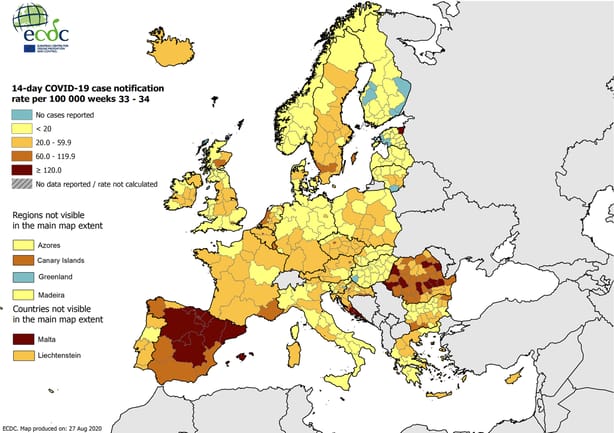
A map from the ECDC shows four regions in Ireland, as well as Northern Ireland, as having 20 to 59.9 cases per 100,000 people.
Ireland's 14-day incidence rate of Covid cases ranks 13th in the list of the 31 countries covered by the ECDC.
The ECDC says that up to today, 419,849 cases of the disease have been reported in Spain, with 328,846 in the UK.
There have been 262,540 cases confirmed in Italy, 253,587 in France and 237,936 in Germany.
Ireland's case number stands at 28,363.
The highest number of Covid-19 deaths have been recorded in the UK with 41,465, Italy at 35,458 and France at 30,544. Spain has recorded 28,971 deaths, while in Ireland the death toll stands at 1,777.
The Chief Executive of the Health Service Executive has said that there figures show that the 14-day incidence of Covid-19 is 27.5 per 100,000.
Paul Reid was speaking at a HSE briefing today.
The ECDC and NPHET figures on 14-day incidence for Ireland can vary for several reasons.
There is a time lag in cases notified to the ECDC, while the ECDC uses an estimated population for Ireland from 2019.

